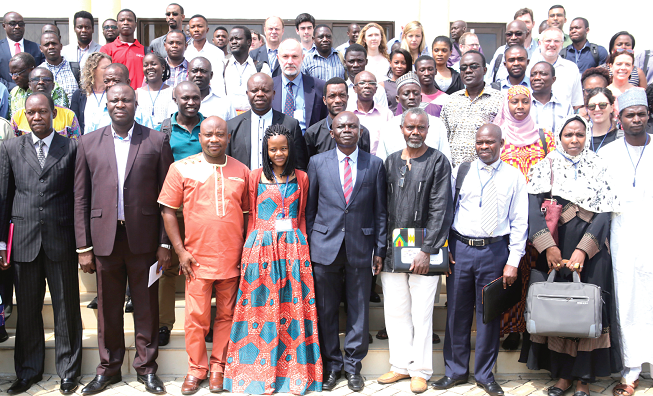
Re-evaluate how policies are conveyed - African policy makers tasked
A two-day international conference on urbanisation and sustainable energy opened in Accra yesterday, with a call on African policy makers to re-evaluate the way policies are communicated to the population.
Delivering the keynote address, Professor Daniel Kebera Irurah, an Associate Professor of the School of Architecture and Planning of the University of Witwatersrand in Johannesburg, South Africa, said understanding the capacity of the brain to act with the right information, knowledge and in the right context, was necessary in getting the continent to change.
The conference, organised by the Institute of Statistical Social and Economic Research (ISSER), under the College of Humanities of the University of Ghana, is on the theme: “Strategies for sustainable energy transitions in urban sub-Saharan Africa.”
It will explore new technologies in energy and how the continent can take advantage of them.
The conference is part of a project dubbed “Supporting Sub-Saharan Africa’s Municipalities with Sustainable Energy Transitions (SAMSET).
SAMSET is a project funded by the Department for International Development (DFID), the University College of London (UCL), the Department of Energy & Climate Change (DECC) and the Engineering & Physical Science Research Council (EPSRC).
Mind change
Prof. Irurah explained that research in neuroscience had shown that change did not only depend on rational communication, but also depended on one’s environment, society, understanding and the undisclosed drivers of behaviour.
“The mind does not stand by itself, it is embedded in its culture, it is embedded in its natural environment, so if you are trying to change behaviour merely by preaching, you will not get anywhere,” he pointed out.
“Let us re-evaluate how we have tried to communicate,” he challenged leaders, tasking them to understand the undisclosed drivers of people’s behaviours.
He said because of the capacity of the mind to rewire, shed old behaviour and take up new ways of doing things at any period in life, there was hope for change.
Prof. Irurah said most developing countries were using neuroscience in the adaptation of new technologies, adding that because of the human being’s capacity to rewire, there was opportunity for change in Africa.
That, he explained, was, however, dependent on policy makers to understand and evaluate how to communicate in achieving change for sustainable cities.
SAMSET
In an overview of SAMSET, the Scientific Lead of the project, Mr Mark Louis Borchers, said the aim of the project was to build capacities in green energy development in municipalities in Africa, through learning, knowledge sharing and networking, as well as in the exchange of technologies.
He said through strategic partnerships and in line with the Sustainable Development Goals (SDGs), the aim of all partners was to transit the continent from urban challenges to a greener development.
A representative of the funders of the project, that is, UCL and the DFID, Dr Xavier Lamaire, said SAMSET was one of the 13 projects being funded by the organisations.
He said sustainable cities meant cities where development went on sustainably for people and the planet, and where inequalities were reduced.
The Director of ISSER, Prof Felix Ankomah Asante, in a welcome address, described the theme of the conference as appropriate.
He said people were relocating to urban areas, and their greatest need was energy, for which reason, developing clean sources for the teeming masses of people was important.
He called on the government to pay attention to resourcing municipalities and districts to stem the tide of migration into the urban areas.
Additionally, he tasked the government to invest in cities and clean technologies for life.
